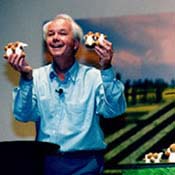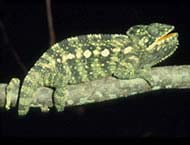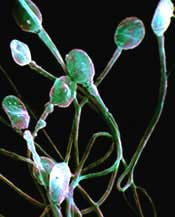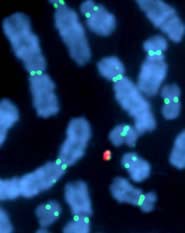
Mathematician Ian Stewart talks to Nature Science Update about snowflakes, sticklebacks and a new kind of science.
Ian Stewart was turned on to mathematics at the age of seven. A broken collarbone freed him from an uninspiring teacher allowing his mother to ignite his interest in numbers while he was laid up at home.
His writing career began with a series of how-to manuals for now-defunct early 1980s microcomputers. It has since broadened into popular science and science fi

Chameleons can reel in prey anywhere within two-and-a-half body lengths of their jaws. Their tongues can overcome even a bird’s weight and reluctance to be eaten. How? Muscles that are unique among backboned animals, researchers now reveal.
Anthony Herrel of the University of Antwerp, Belgium, and colleagues put crickets at different distances from the noses of two chameleon species, Chameleo calyptratus and Chameleo oustaletti. The tongues of these 12-cm-long reptiles pull at maximum stren

Sperm go slow without a crucial protein.
The discovery of a protein that is crucial to sperm swimming in mice could lead to new male or female contraceptives or fertility treatments.
The protein forms a channel through the membrane of the sperm tail. It controls the inflow of calcium ions that trigger swimming.
All humans have the gene that encodes the channel, but it is switched on only in sperm cells. This would lessen the risk of side-effects from any channel-blo

Chemists copy bacterial tricks for making clean fuel.
Bacteria are teaching chemists their tips for creating lean, green fuel. US researchers have developed a catalyst based on a bacterial enzyme that converts cheap acids to hydrogen, the ultimate clean power source.
Unlike other fuels, hydrogen is non-polluting: its combustion makes only water, instead of greenhouse gas carbon dioxide or the poison carbon monoxide. Thomas Rauchfuss and colleagues at the University of Illino

Cosmic lens magnifies faint galactic building-block.
Astronomers have peered deep into space and time and spotted a baby galaxy. Their results suggest that the tiny star-forming region may have helped to build today’s Universe 1 .
“We believe this is one of the galactic building-blocks that join together to make larger galaxies,” says Konrad Kuijken, of the Kapteyn Institute in Groningen, the Netherlands, a member of the team that found the object. The mergin

Sequencers expose secret chromosome centre.
February’s celebrations hid a dark secret: the human genome sequencers hadn’t touched the hearts of our chromosomes. Now, at last, one chromosome’s inscrutable midpoint, its centromere, has given up its genetic secrets.
Centromeres look like the ’waist’ in an X. They share out chromosomes fairly when a cell divides. Defective centromeres may underlie many cancers, in which problems with chromosome movement

– new calculation confirms standard model of particle physics. Contribution of hadronic vacuum polarization determined with unprecedented accuracy. The magnetic moment of the muon is an important precision parameter for…
Technique may prevent formation of unwanted waves that siphon off needed energy. Heating plasma to the ultra-high temperatures needed for fusion reactions requires more than turning the dial on a…

An international team of astronomers, led by researchers from the Astronomical Observatory of the University of Warsaw, have identified a new class of cosmic X-ray sources. The findings have been…

How deubiquitinases USP53 and USP54 cleave long polyubiquitin chains and how the former is linked to liver disease in children. Deubiquitinases (DUBs) are enzymes used by cells to trim protein…

Conceptual blueprint to analyze experimental catalyst data. Machine learning (ML) models have recently become popular in the field of heterogeneous catalyst design. The inherent complexity of the interactions between catalyst…

Antibody that Neutralizes Inhibitory Factors Involved in Nerve Regeneration Leads to Enhanced Motor Function after Acute Spinal Cord Injury. Researchers at 13 clinics in Germany, Switzerland, the Czech Republic and…

How simulations help manufacturing of modern displays. Modern materials must be recyclable and sustainable. Consumer electronics is no exception, with organic light-emitting diodes (OLEDs) taking over modern televisions and portable…

“Neurons that fire together, wire together” describes the neural plasticity seen in human brains, but neurons grown in a dish don’t seem to follow these rules. Neurons that are cultured…

The quest for sustainable energy solutions has been a major focus of scientific research for decades. Solar energy, a clean and renewable source, has emerged as a promising alternative to…

With a processing speed a billion times faster than nature, chip-based laser neuron could help advance AI tasks such as pattern recognition and sequence prediction. Researchers have developed a laser-based…

New technology could remotely identify various types of plastics, offering a valuable tool for future monitoring and analysis of oceanic plastic pollution. Researchers have developed a new hyperspectral Raman imaging…

Artificial Intelligence (AI) has established a strong presence across industries, large and small. The “VoBaKI” research project has empowered small and medium-sized enterprises (SMEs) with an innovative tool to independently…